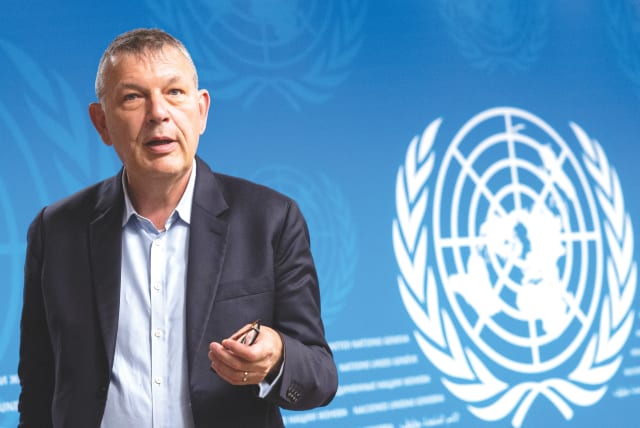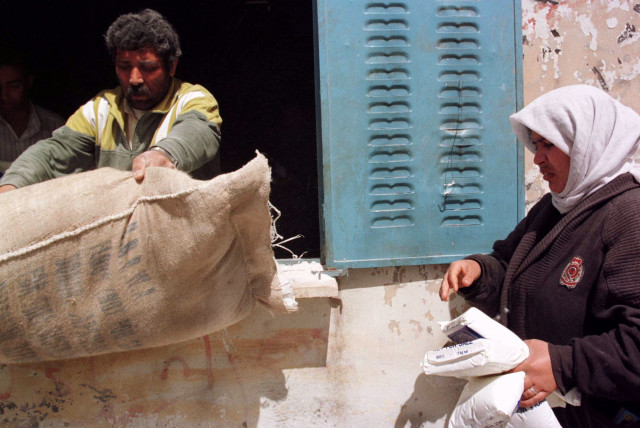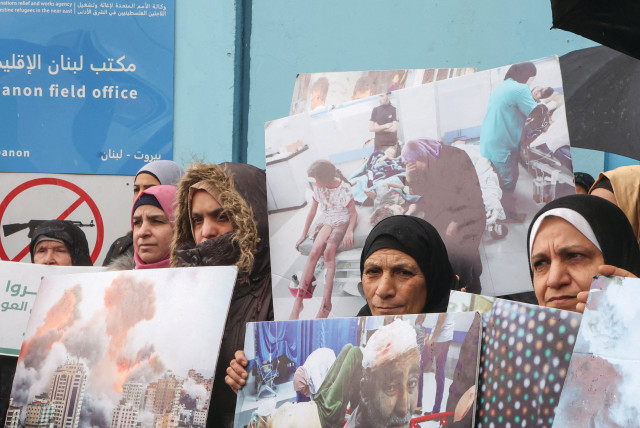The UNRWA probe ignores the key issue - opinion

UNRWA had been transformed into a bloated international bureaucracy with a staff in excess of 30,000 and an annual budget of around $2.2 billion.
Consumers of news media may have gained a rather distorted view of recent events concerning UNRWA (the UN Relief and Works Agency for Palestinian Refugees). The position is not quite as many of the journals have been suggesting.
On January 26, Philippe Lazzarini, UNRWA’s head, stated: “The Israeli authorities have provided UNRWA with information about the alleged involvement of several UNRWA employees in the horrific attacks on Israel on October 7.” Shortly afterward UN Secretary-General Antonio Guterres clarified that 12 UNRWA employees had been identified, of whom nine had been fired, one was dead, and the identities of the other two were still being confirmed.
More than a dozen countries, including the United States, immediately suspended their funding of the agency, causing a financial shortfall of about $450 million.
UNRWA denies claims of terrorist involvment
A few days later, Guterres set up two separate investigations. A review team, led by former French foreign minister Catherine Colonna, was tasked with assessing how far UNRWA adheres to the principles of neutrality in its operations, while UN’s top watchdog, the Office of Internal Oversight (OIOS), would investigate the veracity of Israel’s claims against the 12 UNRWA staff members. Israel later provided the UN with detailed allegations about seven more UNRWA staffers.
ON APRIL 22 the Colonna-led review issued its report into UNRWA’s “neutrality” in carrying out its functions. The report identified no less than 50 aspects of the agency’s operations where it fell short, and recommended changes in each case. Guterres immediately accepted all 50 recommendations, and announced that UNRWA “will establish an action plan to implement the recommendations contained in the final report.”
Although it was not part of the Colonna team’s brief to comment on the OIOS investigation into Israel’s charges against UNRWA staff, they thought it appropriate to include the following in their 54-page report: “Israel made public claims that a significant number of UNRWA employees are members of terrorist organizations. However, Israel has yet to provide supporting evidence of this.”
Inevitably the world’s media leapt upon this nugget, to the virtual exclusion of everything else in the report. The headlines were a classic exercise in schadenfreude: ”Israel failed to support its claims about UNRWA staff”; “Israel has yet to produce evidence for claims against UNRWA”; “Report finds ‘No Evidence’ in key dossier”; “Israel hasn’t offered evidence tying many UN workers to Hamas,” and so forth, and so on. But all were premature in their assumptions.
On April 26, UN spokesperson Stephane Dujarric provided the media with the first authentic information on the investigation ordered by Guterres into Israel’s charges against UNRWA personnel. He explained that the total of 12 UNRWA staffers originally named by Israel had been augmented later by seven more – five in March and two in April. Of the 19 allegations, one case had been closed for lack of evidence, while four others had been suspended for insufficient evidence. Currently, UN investigators are looking into allegations against 14 members of UNRWA’s staff.
Dujarric told reporters that OIOS investigators had already met with Israeli authorities and would visit again in May. They had, however, given no indication of when their investigation would be completed. “These discussions are continuing,” he said.
The suggestion in the Colonna review that Israel cannot substantiate its allegations against named UNRWA staff is belied by the fact that the OIOS investigation is very much ongoing. What the Colonna report does reveal, however, is that UNRWA is an organization flawed in its operations by 50 examples of bias – and it would not require many guesses to determine against whom the bias is directed.
William Shakespeare was adept at inventing insults. Somewhere in his play King Lear he has one character roundly condemning another in these terms: “Thou whoreson Z. Thou unnecessary letter…” “Unnecessary” is a label that could well be applied to UNRWA.
Around the time that the State of Israel came into being, around over half the non-Jewish population of what was called “Palestine” at the time, some 750,000 people, left their homes – some on advice, some from fear of the forthcoming conflict, some during the fierce exchanges.
After the armistice, the UN set up a body to assist them – UNRWA. It began its work in May 1950. Seven months later, the UN established the Office of the UN High Commissioner for Refugees (UNHCR), excluding Palestinian refugees from its remit. Ever since, to their disadvantage, Palestinians have been treated differently from all other refugees in the world. One reason is that from the start UNRWA totally ignored a key aspect of its responsibility.
The 1949 UN General Assembly resolution that established UNRWA called for the alleviation of distress among Palestine refugees and stated, crucially, that: “Constructive measures should be undertaken at an early date with a view to the termination of international assistance for relief.” In other words, the new agency’s mission was intended to be temporary, as the refugees under its wing were resettled.
UNRWA perpetuates the cycle of refugees
RESETTLEMENT NEVER occurred. On the contrary, UNRWA’s policy was to perpetuate the Palestinians’ refugee status. It decided to regard as refugees all the “descendants of Palestine refugees”– children, grandchildren, and great-grandchildren in perpetuity. The effect? The number of Palestinians registered by UNRWA as refugees, in camps scattered around the region, has mushroomed from around 750,000 in 1948 to 5.9 million at the last count and is growing exponentially year on year. Its expanding client base is, of course, used by UNRWA to justify an ever-larger staff and an ever-increasing budget.
By 2024 the “temporary” UNRWA had been transformed into a bloated international bureaucracy with a staff in excess of 30,000 and an annual budget of around $2.2 billion.
Worse than that, nearly six million people had been converted into permanent charity-dependent clients, with no incentive to become part of productive economically independent communities where those able to work have well-paid jobs, and the population thrives on earned incomes, not handouts.
While UNHCR, the main UN agency dealing with refugees, concentrates on resettling them, facilitating their voluntary repatriation or their local integration, UNRWA maintains in their refugee status decade after decade an ever-expanding client base.
There is every good reason to reform the present situation. Though of course, the services UNRWA currently provides are essential, there is absolutely no need for that flawed organization to run them.
It should be dissolved, and its functions absorbed into an enlarged UNHCR, an efficient well-run organization.
UNHCR is a global body dedicated to supporting people who have fled their homes because of conflict or persecution. It protects their rights and crucially, unlike UNRWA, does not perpetuate their refugee status but helps them rebuild their lives. It has a positive agenda.
The unnecessary UNRWA is based on a negative philosophy.
All this, vital though it is, was of course well beyond the scope of the Colonna report.
The writer is the Middle East correspondent for Eurasia Review. His latest book is Trump and the Holy Land: 2016-2020. Follow him at: a-mid-east-journal.blogspot.com.
Jerusalem Post Store
`; document.getElementById("linkPremium").innerHTML = cont; var divWithLink = document.getElementById("premium-link"); if (divWithLink !== null && divWithLink !== 'undefined') { divWithLink.style.border = "solid 1px #cb0f3e"; divWithLink.style.textAlign = "center"; divWithLink.style.marginBottom = "15px"; divWithLink.style.marginTop = "15px"; divWithLink.style.width = "100%"; divWithLink.style.backgroundColor = "#122952"; divWithLink.style.color = "#ffffff"; divWithLink.style.lineHeight = "1.5"; } } (function (v, i) { });


